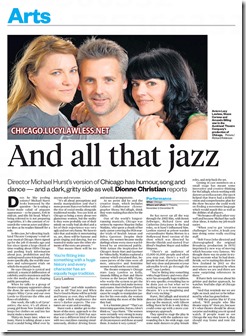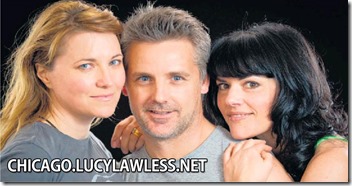Director Michael Hurst’s Version of Chicago has humour, song and dance – and a dark, gritty side as well. Dionne Christian reports
NZ Weekend Herald
26 October 2013
Does he like peeling onions? Michael Hurst looks bemused by the question — he is eating a home- made salad of piquant appearance — so he pauses, fork in mid-air, and tilts his head. What’s being referred to is not preparing vegetables; it’s the amount of research the veteran actor and director does as he readies himself for a role.
 In this case, he’s directing Auckland Theatre Company’s end- of year musical Hurst signed up for the job 15 months ago and has since spent a large chunk of time reading about 1920s Chicago and peeling back information about jazz, prohibition and the underground scene it inspired and, more specifically, the real-life murders and subsequent trials on which the musical is based.
In this case, he’s directing Auckland Theatre Company’s end- of year musical Hurst signed up for the job 15 months ago and has since spent a large chunk of time reading about 1920s Chicago and peeling back information about jazz, prohibition and the underground scene it inspired and, more specifically, the real-life murders and subsequent trials on which the musical is based.
He says is cynical and satirical; a musical deliberation of celebrity and its transience and the role the media plays in shaping public perception.
When he talks to a group of theatre company supporters about the show, he uses the example of singers Miley Cyrus and our own Lorde to illustrate the ebbs and flows of celebrity.
One week, the talk is of Cyrus’ antics; the next, it’s all about a young girl from New Zealand who keeps her clothes on and lets her music make a statement.
Thirty-six hours later, when we meet, Hurst is talking about a new local scandal being tilled over by anyone and everyone.
‘‘It’s all about perceptions and media manipulation and that’s more present than ever before with the rise of social media alongside traditional media. You can look at
as being a story about two glamorous women, but the reality is they were probably out of their minds on really bad alcohol and a lot of their experience was very ugly and not very funny. We have to take that and make it entertaining so, yes, there will be humour and great singing and dancing, but we wanted to make sure the other elements of the story are present.’’
That means there will be no ‘‘jazz hands’’ and while numbers such as and
will be as bold and brassy as ever, they will have an edge which emphasises the story’s darker aspects. The costumes are scant and revealing.
Hurst took a similar get-to-theheart-of-the-story approach to the musical in 2010 but says that was a different kind of show with two storylines running simultaneously, distinct driving forces and musical arrangements.
At no point did he and the creative team, which includes
collaborator choreographer Shona McCullagh, think they were making that show for the 1920s.
One of the world’s longest running musicals, was written by reporter Maurine Dallas Watkins, who spent a chunk of her early career covering the 1924 murder trials of Beulah Annan and Belva Gaertner. Despite their crimes, the women became media darlings whose every move was followed by an entranced public. With Annan the inspiration for Roxie Hart and Gaertner for Velma Kelly, Watkins explored a rumour which circulated that, because jurors of the time were all men, attractive and feminine women would not be convicted.
The theatre company’s stars Lucy Lawless as Kelly, Amanda Billing as Hart and Shane Cortese as the lawyer Billy Flynn, who works the system to get the women released and make money and a name. Hurst believes Flynn is the most corrupt character because he sought to manipulate justice for his own ends; the women were making the most of the little they had.
Is it a feminist piece? ‘‘ That’s an interesting question, but no, I don’t think so,’’ says Hurst. ‘‘The women were certainly very strong in many respects but they were at the mercy of circumstances and those around them. It makes it very cynical.’’
He has never sat all the way through the 2002 film, with Renee Zellweger, Richard Gere and Catherine Zeta- Jones in the lead roles, so it hasn’t influenced him. Lawless starred as prison warden extraordinaire Mama Morton in a Hollywood Bowl version of the show which was directed by Brooke Shields and starred Stephen Moyer and Ashlee Simpson.
‘‘There’s an audience of 15,000- 16,000 people and when you step out, there’s a wall of people in front of you but they still feel very close and present so your adrenalin levels go through the roof,’’ says Lawless.
‘‘You’re fitting into something with a huge history and every character has an equally huge tradition. It’s very specific; everything has to be done just so but what we’re working on here i s not museum theatre. It’s a re- imagining and that’s very exciting.’’
Hurst, McCullagh and musical director John Gibson were keen to jazz up the musical, with Gibson telling Hurst he’d do it only if they could come up with a more contemporary approach.
They opted to stage the play in the round, with the audience surrounding the 4.3m-wide stage, cast some male dancers to play female roles, and strip back the set.
Getting 14 cast members on a small stage has meant some innovative and creative thinking for McCullagh, who is working with dancers as well as actors. She says it helped that Hurst had a definite vision and comprehensive plan for the show because she could work on finding a movement language which would match this as well as the abilities of all players.
‘‘We bounce off each other very well and because Michael has such clear ideas, it makes my job much easier.
‘‘When you’ve got ‘creative challenges’ to solve, it leads you into doing some really exciting stuff.
‘‘Bob Fosse [who directed and choreographed the original Broadway production in 1975] imprinted a new way of moving which became very famous. We thought there was no point in trying to recreate what he had done. Beside, we’re making this show for New Zealand in 2013 so the movements are inspired by when and where we are and there are some surprising references in there.’’
If Hurst feels nervous about his grittier and darker approach, he watches YouTube clips of shows.
‘‘And that reminds me we are right on track and not to be influenced by what has gone before.
‘‘Will the purists like it? If you asked, ‘ Will people who like theatre enjoy it?’ then yes, because it’s what theatre should be about: surprise and making you sit up and watch. If people want to see the way they know it, they should stay home and rent the film.’’
For more on Lucy’s role as Velma Kelly in Chicago, go to AUSXIP Lucy Lawless Chicago The Musical (Auckland) subsite
